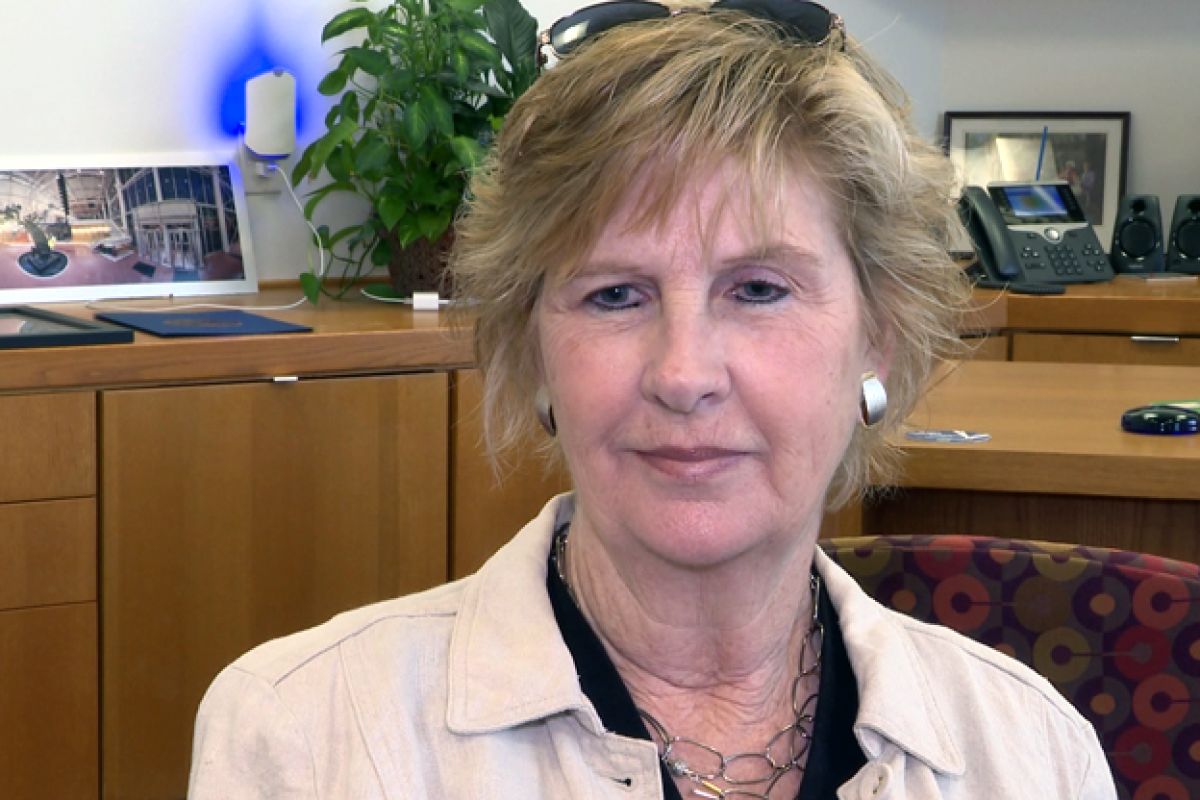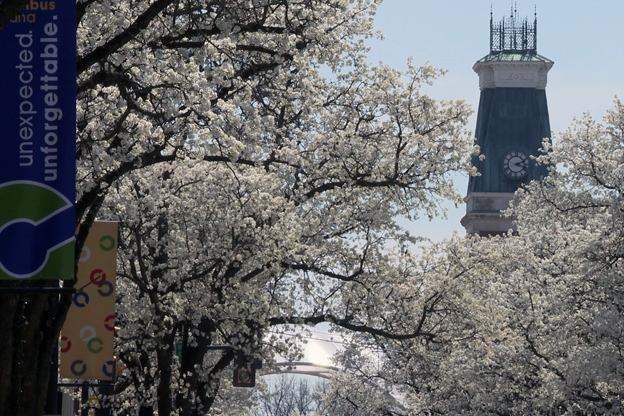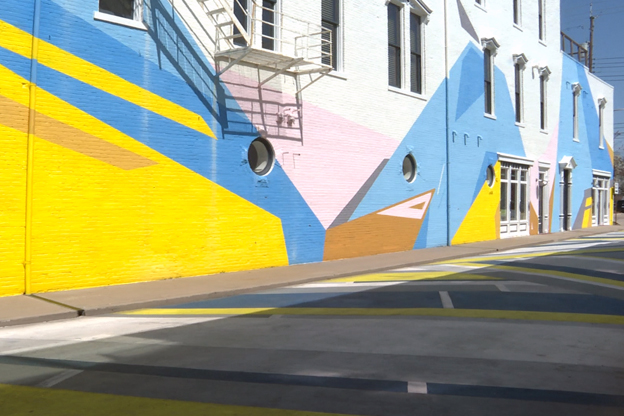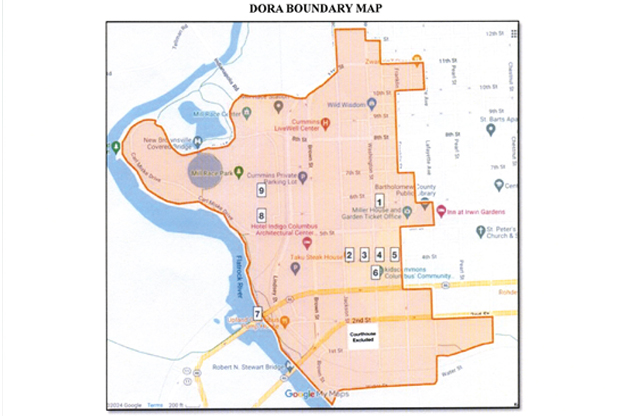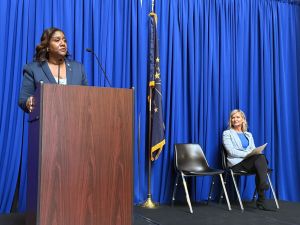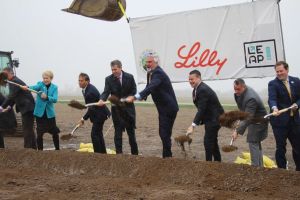Hello and welcome to ask the mayor on WFIU. I'm Joe Hren, this week we're in Columbus with Mayor Mary Ferdon. Hello, welcome. Thanks so much for having us in Columbus on a beautiful, sunny spring day, it
Speaker 2
is, well, happy, April 1 right? April 1 day. Yeah, no jokes here, no. We've already
Speaker 3
had our first joke some over in Mill race Park, we have this beautiful covered bridge, and someone posted this morning pictures of the car that had crashed in the bridge and it torn out the entire floor, and so I have the parks director calling me at 730 this morning saying that was an April Fool's joke. It really didn't happen. See, look, the bridge is still intact. So yes, we got hit early this morning. Oh, boy.
Speaker 1
Well, speaking of getting hit severe weather, Sunday, I was live on WTIU doing weather cut ins, and saw tornado warning. It started in Monroe County, Brown County, Bartholomew County, Shelby County, Decatur County, but Columbus was right in the path of that storm. We
Speaker 3
were we were really fortunate, as I was kind of saying earlier. I live on the north side of the city, and we saw a lot of clouds that tried to form and quite couldn't. But as far as I know, we didn't have any actual tornadic activity. And the city really was fortunate. We've had some downed trees and some limbs, but it's not been as bad as we've seen in other areas and or in other storms. About a week ago in Bartholomew County, we had an EF tornado out in the county and saw some pretty significant damage there. So it is spring, and we every time we get the opportunity, we encourage people to have a plan for severe weather. You know, go to your basement, go to an interior room with an interior wall, because I think this is going to be an active season. It's already started, and today is just the first day of April. So yeah,
Speaker 1
and we saw we posted some things on social media and people saying, Oh, I didn't hear the sirens. I don't know, does Bartholomew county had siren? Yeah, we
Speaker 3
do. We have 14 sirens within the city. I think there's another seven are out outside. But what people need to understand is the sirens were for if you're outdoors, hearing them, if you're inside, if you're in your basement, or if you're working you've got headphones on, you are not going to hear them. So that's why we have an emergency alert called ever bridge, that we ask people to sign up for, and you'll get it on your phone. You can get on your computer, you can get it on your landline. So that's what we encourage, because those sirens you can't if there's a lot of wind to sometimes it carries the siren sound away, but, you know, it's great if you're outdoors, but it's really important to be keyed in, because we've seen some significant damage already this year across the south, the southern United States with with tornadoes.
Speaker 1
Yeah, and I could say the same for those of you who listen to WFIU, WTIU, sorry, I should give a little plug. Yes, media the radio stations here in Columbus as well that have EAS emergency alert systems that are activated or live personnel that come in to do weather alerts too. And this airs Wednesday morning. And just to be note that there's another round of severe weather by the National Weather Service predicting Sunday night into the early morning hours. So right, right. Get ready,
Speaker 3
right. And so yes, you should have your your radio tuned in to WFIU. You to get your local emergency alerts and and, yes, local media has been great at keeping people up to date. So let's
Speaker 1
move on to just starting a bit more in general, here we have more executive orders coming from President Donald Trump. I know we talked a couple months ago about some of the funding cuts, some freezes, reviews. Talked about this with grants, federal funding from health, nonprofits, education. And this can all, of course, trickle down to local cities like Columbus, and we're receiving some emails from people saying, Can you please ask local officials? How is this affecting? What are they worried about, right now, right?
Speaker 3
So, like every other community, we're paying as much of attention as we can. We do get quite a bit of federal grant money and transportation system. We get some for utilities. We get a lot for our metropolitan planning organization, and so we're we watch what's happening right now. We're continuing to hear that we're getting that grant money. My concern is actually even greater than Columbus, because we have a lot of our businesses here in town who get significant amounts amounts of funding from the federal government for research. And I was just talking with a local business owner who they, again, were a very manufactured, heavy manufacturing area. And so we get a lot of research grants around energy and batteries and things of that nature. And so watching. How it will affect their business. And some have continued to see grant dollars come through, and others or have been in a freeze, and so they're kind of waiting to see what the next steps are. So yeah, it's very concerning. The best that we can do is watch at this point in time and hope that as a new administration gets people on board and they understand the grant process and how local governments and local businesses have built budgets and rely on that that will continue to see grant money come through. But it is very, very concerning right now,
Speaker 1
Bloomington, Columbus are working on installation of fiber broadband as a utility, like utilities, it's just more available as as is, as if water gas make it more equitable. It's a long process, though you're digging underground. I know Bloomington had sudden hiccups along the way, and I've heard there might be some contractor issues in the county here, right? How's it going in the city? The
Speaker 3
city, I believe, is about 80 to 85% completed, so we we don't have as many issues. Yes, the the one of the local subcontractors who was actually laying the fiber has declared bankruptcy as my understanding. And so the Hoosier fiber network is looking, looking for new contractors. So it really is affecting Bartholomew county more than it is the city. But I know it is something that communities really need to have, that fire, that connection. And so we're hoping that that they'll be able to find a contractor quickly, and we continue to have conversations with the company.
Speaker 1
Is some of that fiber through the city? I guess they call it lit? Is it live for customers?
Speaker 3
Yeah, we've already had many people who've been able to sign up to, I think it's a gigabit now. So it's, you know, I'm not going to do an advertisement for that over someone else. But yes, we've already had a number of city residents who've who've become customers.
Speaker 1
But, I mean, it is being developed by the city through a contract with was it? Meridian, right?
Speaker 3
Meridian, right, correct. The city did not have to pay anything. So this is something that was done basically free for us. The county, I think, used three to $4 million worth of the American rescue plan dollars. And
Speaker 1
like you said, I mean, the plan, you know, broadband, is just becoming more and more something that just needed in a community to make businesses run residents, everything's run on the internet, right? When do you see that? I mean, is there a certain measuring stick or point that you know that, that that, and you know that entire investment was worth doing? I think
Speaker 3
you know the tipping point is obviously when we feel like we can get it to the people who, who, who'd haven't had access. And in the city of Columbus, the numbers are probably smaller than out in the county, you mentioned businesses, and that's important. And then we have remote workers, but I think for our educational system, making sure it gets to not only city, but our county school kids who more and more fall behind if they don't have access to the internet, if they don't on a school day when there's snow or when the weather is bad, if they can't get online with other kids, then it really does put them behind. So I believe the city is in a good place again. We've got to get it completed. I think the county is going to wait until they obviously is going to have to wait until they get a new contractor for that.
Speaker 1
Maybe a Dora update. That's the designated outdoor recreation area. Is that right? Yep. And it allows municipalities to designate an outdoor area. It allows the transfer of alcoholic beverages within that specific area. So we're thinking economic, tourism development. I know Columbus was approved by the state for what 2025
Speaker 3
Correct, right? And so it's spring, and events are beginning to start. And so, in fact, our local Board of Public Works just approved last I guess it was approved today, an application for a temporary permit for an event that so it will be the first one in Columbus, Thursday night, April 3. It's on Sixth Street, so feel free to come downtown and enjoy, and we'll see how it works. I think the downtown community has been very, very supportive. We worked through the process making sure that all the stakeholders are involved, understanding what it means you have to have special cups made which designate the door area so that you can't have people bringing in alcohol from, you know, the exterior area. So yeah, today, our Thursday nights, our first example of how it will work. And so we're excited to, you know, hopefully we won't have bad weather, and we would invite people to come down to Sixth Street in Columbus. And I
Speaker 1
assume there's a lot of signage too that has to go right up yet. Or I don't
Speaker 3
that may be temporary. I don't know. Like I said, this will be our first. Development. I
Speaker 1
hear there's a proposed mixed use development for the corner of 11th and Washington streets downtown, but a tax increment district didn't pass city council. So first, what's planned for that area, and then what happened at city council a few weeks ago?
Speaker 3
Right? So it's a long process. Developments like that go through the plan Commission. They sometimes they have to get go through Board of Appeals. They also go to city council, because of, in this particular case, redevelopment was giving them funding to help with the project. So we did end up with a development we're excited about. It's a mixed use, no, I'm sorry. It's a it's a housing development. It has 120 units of housing. I think 10% are designated for low income. It will go on a corner where we've had an we had an old bank and some older homes that we really haven't had any development there for many, many years. So we're very excited about that. We had. Part of the process was to create a TIF allocation area just around that development, and so then that would help us recoup the $6.4 million of redevelopment dollars over the life of the TIF. Unfortunately, that was a tie in in city council, and some members chose to vote against it, but the city administration and the redevelopment commission felt like this is a it's been a long process. We're excited about the product. We desperately need housing downtown, and we know what that will we believe, what that will do for activation of downtown Columbus, so we went ahead and the redevelopment is moving forward. With that development, they won't recoup the 6.4 million over the life of the life of a TIF, unfortunately, but we felt like the trade off was important, just because it just took many years to get us to this place, and we didn't want to start
Unknown Speaker
over. So
Speaker 1
how does that affect or, I guess, what was the thinking behind some of those city council members of why they didn't vote for the TIF in that area?
Speaker 3
Yeah, you're putting the mayor in a hard position to say, tell me what the city council members were thinking. And I knew right when I said that, yeah, yeah, no, I'll just say that. You know, we've we've got a great city council. Some of our members did not support that because they wanted more low income housing. And so I could suppose that maybe that was part of it, but I was really hard for me to guess what was, what was behind their vote, but, but this was great, because in this instance, we could still move forward, because everything else had been approved, had already been approved, and so this was just the final piece. And then I want to assure people that it's not that the developer won't pay taxes. It's just, instead of coming back and the TIF being able to recoup those to go for other developments, it will go back to the city and the county and the schools. So it'll they'll still pay taxes on the property. It's just that we won't be able to get all of our money back.
Speaker 1
That was actually my follow up question. Was, okay, if that six and a half million dollars isn't coming to redevelopment, where does it go? Right?
Unknown Speaker
Yeah, that'll be spread across the other taxing units, right?
Speaker 1
Speaking of other buildings too, the city is looking at potentially moving forward. I assume that the renovations needed to move the public
Speaker 3
Department of Public Works, public works, yeah, yeah. So we have a complex that we've I'm trying to think of what street it's on, and I apologize I should know that we've had for, you know, decades, and we've outgrown it, obviously, as the city has grown. And so we had the opportunity to buy an industrial building off of Indianapolis Road, which is in the northwest and of the community. And with we'll be able to, we purchased the building through the redevelopment commission, and they're also rehabbing it. And so we're going to be able to really expand and be able to have all of our equipment and our vehicles under roof, which we haven't had for many years. It's at a great location. We're actually adding a new salt barn for snow on that same property, and so it gives a lot of room for expansion. So very, very excited. We're actually doing our ground breaking April 14. There's a lot of rehab work that needs to be done, and then hopefully be in by this time next year. So very excited about that. Busy,
Speaker 1
busy. I know I just have about two minutes left. So I did want to leave this to you, because I know you wanted to talk a little bit about the strategic plan too,
Speaker 3
right, forward, right? So moving forward on the Columbus downtown 2030 plan is going great. As I mentioned in an earlier interview, we hired a firm called Sasaki. We've had well over 2500 now people who've responded to a survey telling us what they want. April 17, we have another public session. We had over 300 people of. The first one, lots of involvement, lots of excitement about kind of next steps. And I think this weather gets people excited because it's time to get out and get activated. So we're trying to plan more events to get people out this spring and this summer, and then should have some recommendation in our hand and a report by end of June, 1 of July, and we have another then we've got a team set up that, you know, we're going to basically stick it in their hand and say, Go, right. We've got to have some short term wins, and then we've got to have some short term plans, three to five years, and then some maybe a longer 10 years. So this is, this isn't something that we're going to do and put on the shelf. We're really going to activate this as we've done with our housing, recent housing plan that we've done, we understand the need for housing. We understand the need to have a really vibrant downtown, which goes hand in hand with the housing. And so we want to make sure that we can accomplish something as quickly as possible. And
Speaker 1
transit study, transit River, right? And, yeah,
Speaker 3
got lots more to talk about, right? Yeah. No, no, no, no. Two days are the same around here, no,
Speaker 1
no. And just really quick, any update on the conference center that
Speaker 3
is something that we'll we'll see as probably will show up in that downtown plan. Okay, we have a lot of work. We've got a firm within that plan that's developing a lot of numbers and data points which make it very, very critical to understand, you know, the ROI of putting one in we felt like we had one, you know, pre COVID, and not so sure anything's changed. But, you know, you talked about federal at the federal level with with the tariff conversation, it's really hard to understand what that how that might affect construction, so that's something that we're going to be watching, too.
Unknown Speaker
Thanks so much for your time today. Appreciate it, and
Speaker 3
great to talk with you Joe. Listen to WFIU when you need your up to date emergency alerts for weather.
Speaker 1
Thank you so much. And boy, we'll see you in May. Great. Okay, you.







